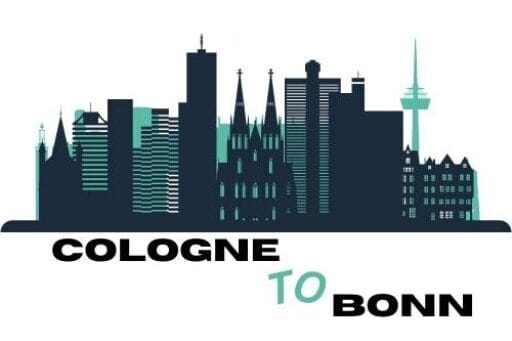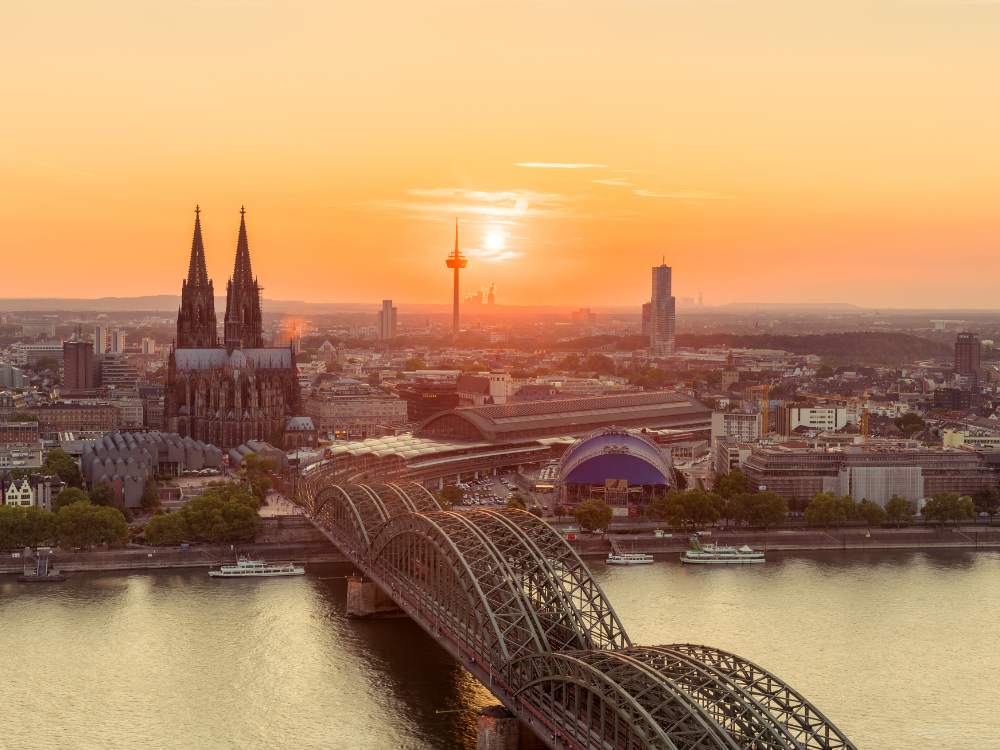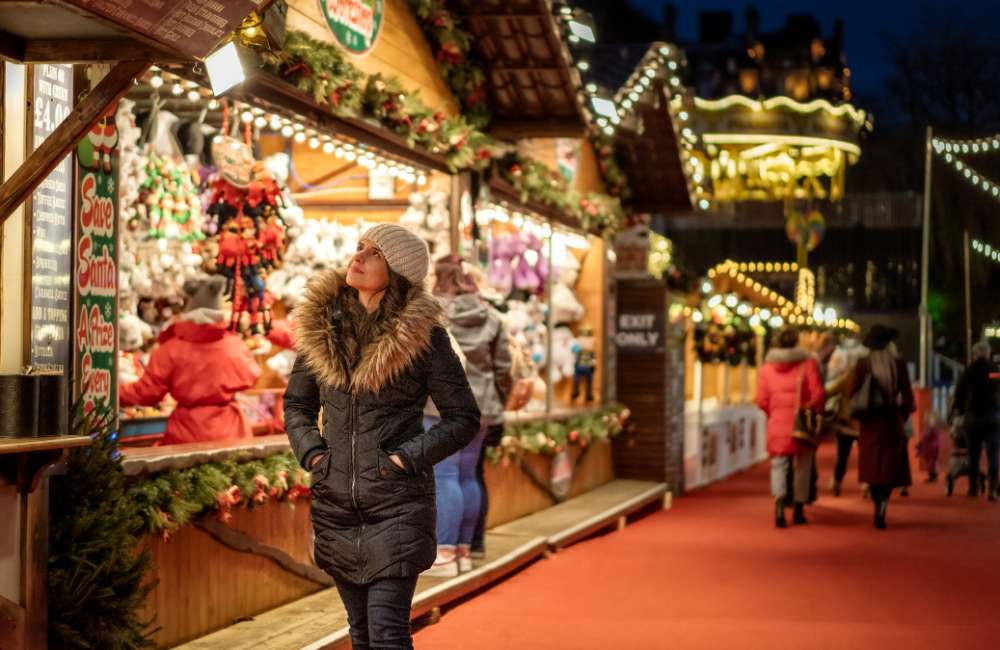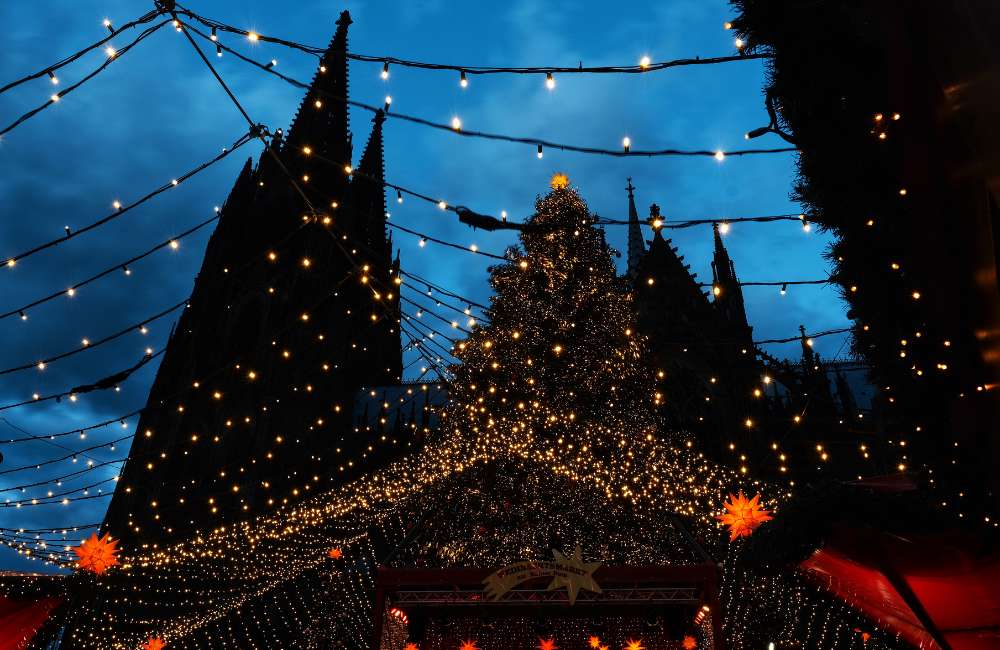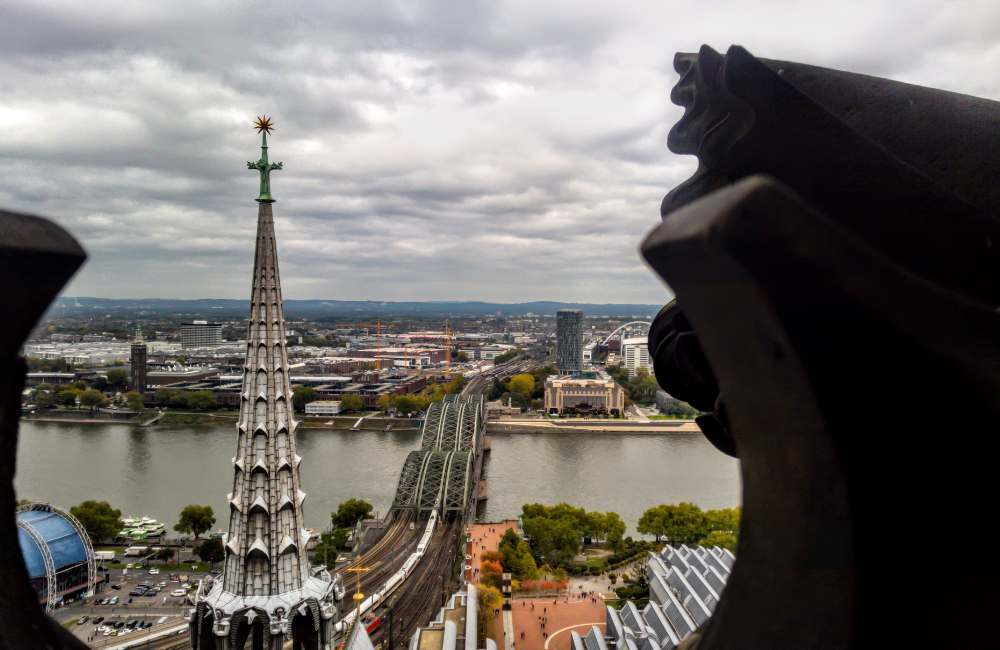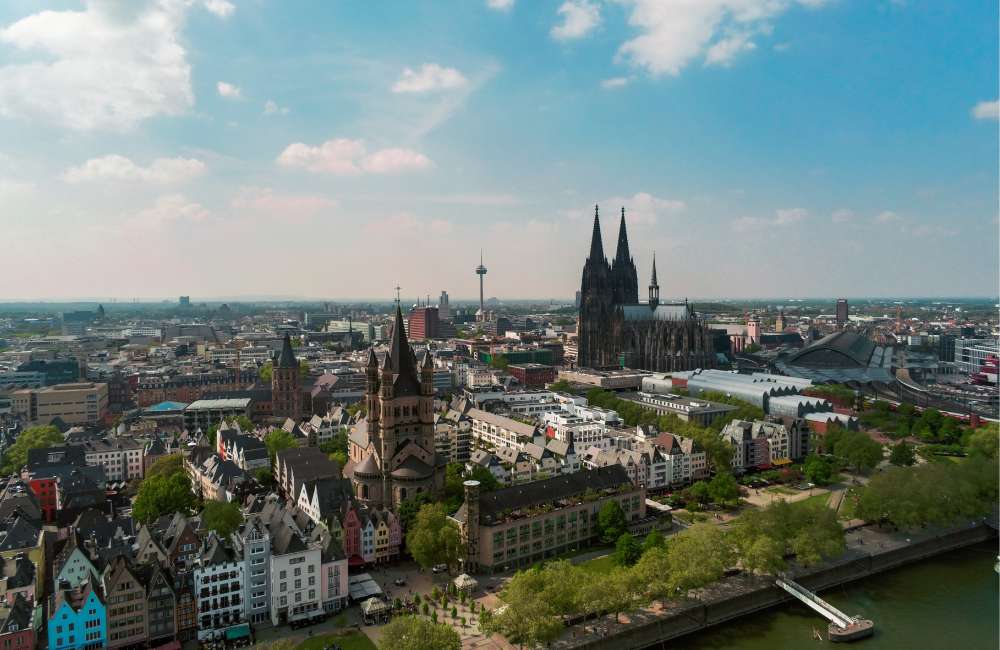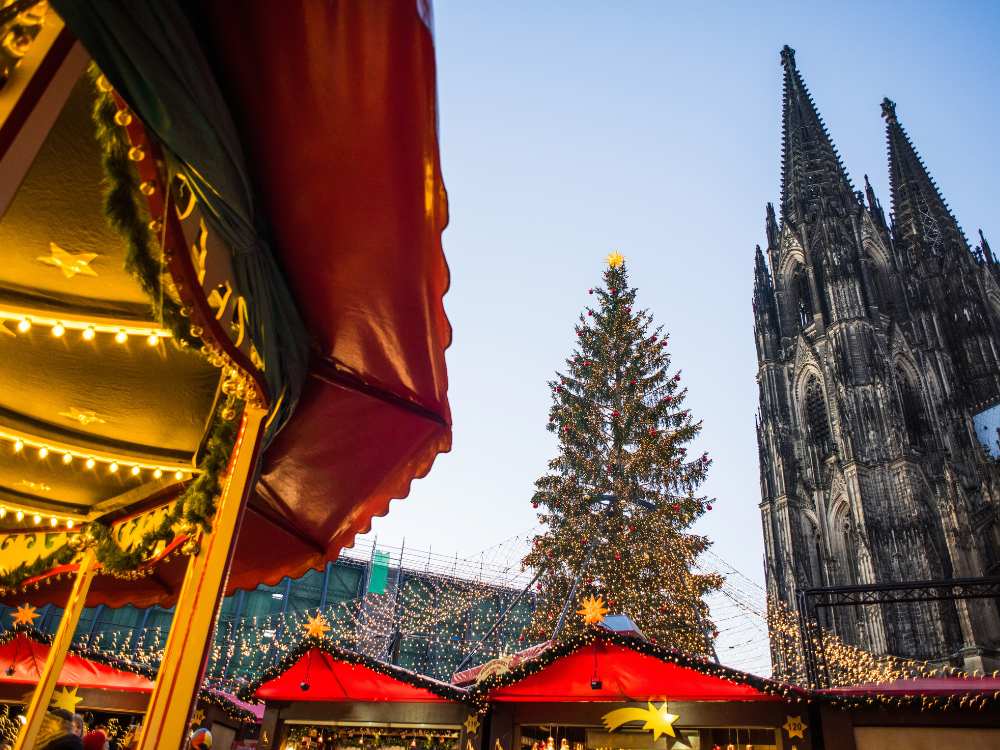Cologne in March: Weather Info & Travel Tips
*Cologne-to-Bonn contains affiliate links and is a member of the Amazon Services LLC Associates Program. If you make a purchase using one of these links, we may receive compensation at no extra cost to you.
WONDERING, WHAT’S THE BEST TIME TO VISIT COLOGNE?
You’ve landed on the right article! I live in Cologne and I’m going to tell you everything you need to know about visiting Cologne in March.
From the weather in Cologne in March, to the best things to do in Cologne in March and even some Cologne travel tips for March — it’s all here. Ready to discover everything you need to know for your Cologne March trip? Let’s get to it!
Cologne in March: Weather Info & Travel Tips
Weather in Cologne in March
Cologne, located in western Germany, typically experiences cool weather in March as the city transitions from winter to spring. The average high temperature in March is around 10°C (50°F) and the average low temperature is around 3°C (37°F).
It’s common to have a mix of sunny and cloudy days during this time of the year, with occasional rain showers.
Average temperatures in Cologne in March
In Cologne, Germany, March is the transition month from winter to spring, and temperatures begin to gradually warm up. The average high temperature during the day in March is around 10°C (50°F), while the average low temperature at night is around 3°C (37°F).
It’s important to note that temperatures can vary throughout the month and can sometimes be colder or warmer than the averages.
- Average high temperature in Cologne in March: 50°F (10°C)
- Average low temperature in Cologne in March: 37°F (3°C)
- What are the hottest months in Cologne Germany? July – August
- What are the coldest months in Cologne Germany? January – February
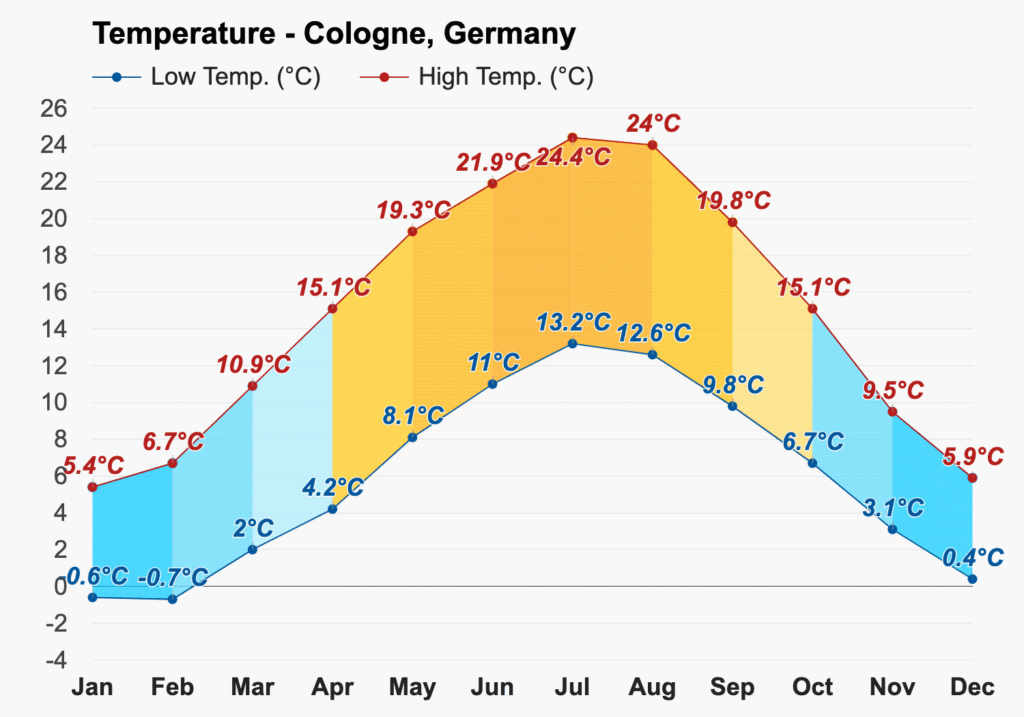
Does it snow in Cologne in March?
While it is possible for it to snow in Cologne, Germany in March, it is relatively uncommon. March is typically a transitional month between winter and spring, and as temperatures gradually warm up, snowfall becomes less likely.
In general, the average precipitation in March in Cologne is around 46mm, and this precipitation is more likely to fall as rain than as snow.
Is there rain in Cologne in March?
Yes, there is a moderate amount of rainfall in Cologne, Germany in March. March is typically a relatively wet month in the city, with an average of 13 rainy days and a total average precipitation of around 46mm.
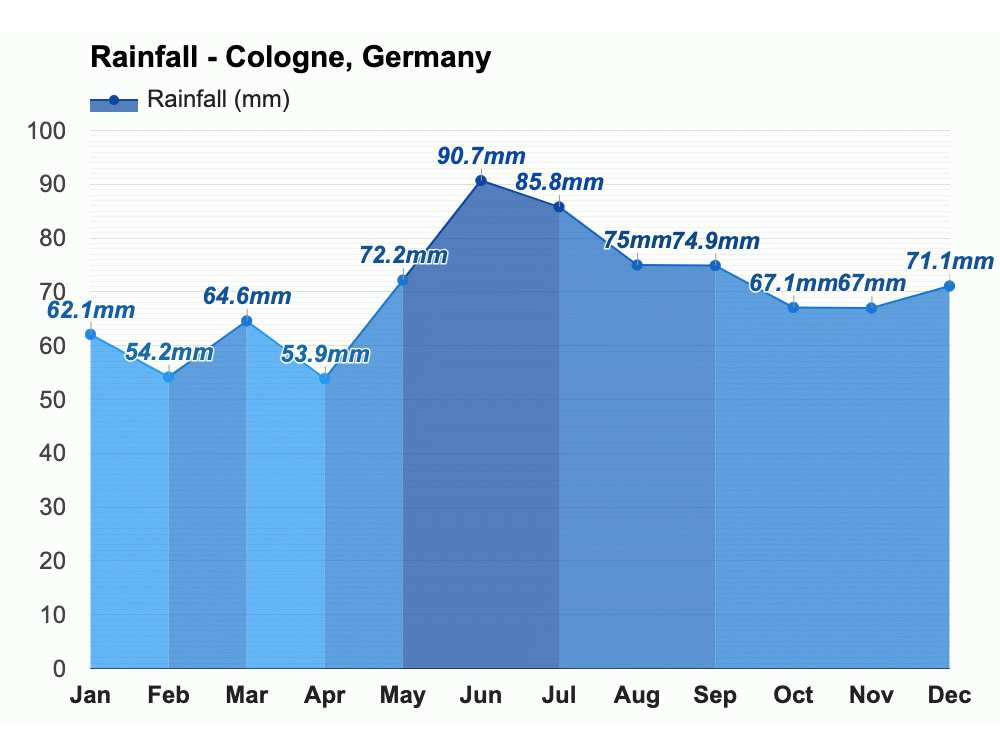
Does it rain all day in Cologne in March?
While it’s possible for there to be periods of all-day rain in Cologne, Germany in March, it’s not typical. March is usually a transitional month between winter and spring, with occasional rain showers and a mix of sunny and cloudy days.
Rain in Cologne in March is more likely to occur as brief showers or intermittent periods of rain rather than all-day downpours.
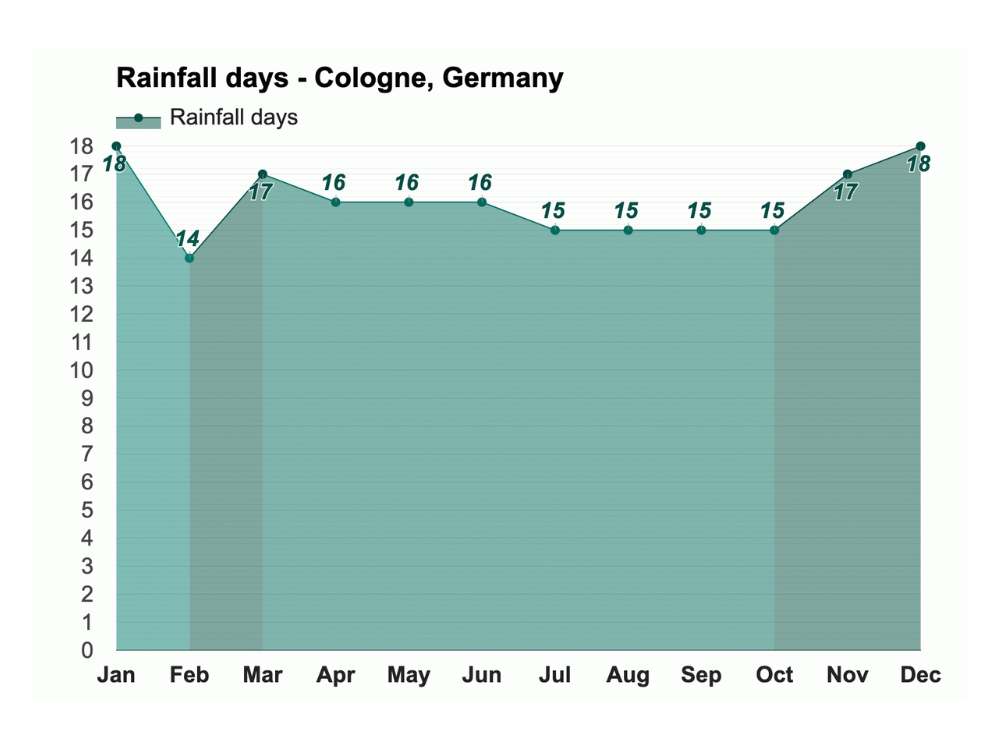
Is there sunshine in Cologne in March?
Yes, there is some sunshine in Cologne in March, although the amount of sunshine can vary depending on the weather patterns. March is typically a transitional month between winter and spring. As the days get longer, there is usually more sunshine than in the winter months.
While March in Cologne can be cloudy at times, there are also usually periods of clear skies and sunny weather. On average, Cologne receives around 4 hours of sunshine per day in March.
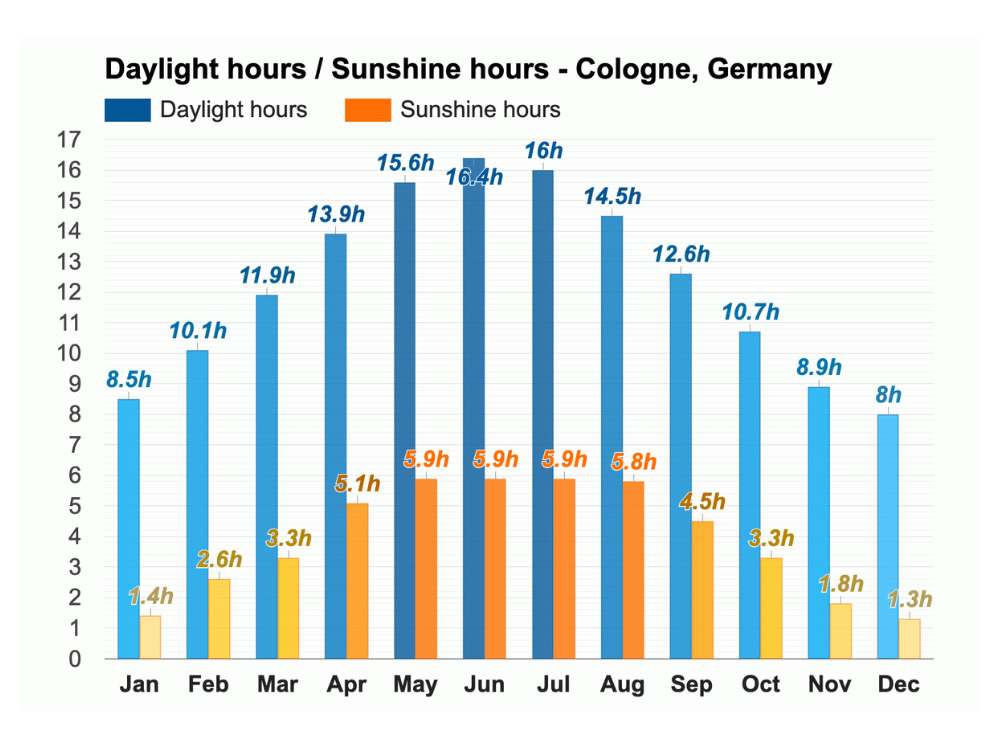
Is it hot in Cologne in March?
The temperature in Cologne, Germany in March can vary depending on the year and weather patterns. However, on average, the temperature in Cologne in March is quite mild, with temperatures ranging from around 1-2°C (33-36°F) at night to around 10-12°C (50-54°F) during the day.
Packing for Cologne in March: What to bring?
If you’re planning a trip to Cologne in March, here are some suggestions for what to pack:
- Warm layers: Even though March in Cologne is generally mild, it can still get chilly, particularly at night. Be sure to bring a warm coat, sweater, and some long-sleeved shirts to stay comfortable.
- Rain gear: March is typically a rainy month in Cologne, so it’s a good idea to bring a waterproof jacket, umbrella, and rain boots.
- Comfortable walking shoes: Cologne is a walkable city, and you’ll likely spend a lot of time on your feet exploring. Bring comfortable shoes that are appropriate for the weather conditions.
- Indoor clothing: You may also want to bring indoor clothing like comfortable loungewear or slippers for when you are inside.
- Adapter: If you’re traveling from outside of Europe, be sure to bring a power adapter so that you can charge your electronics.
- Portable charger: Bring a portable charger for your phone or other electronic devices, as you may be out and about all day and need to recharge.
- Camera: Cologne is a beautiful city with many historic landmarks and attractions, so don’t forget to bring a camera to capture your experiences.
- Medications: If you take any prescription medications, make sure to bring enough to last the duration of your trip.
- Travel-sized toiletries: Pack travel-sized toiletries to save space in your luggage, including shampoo, conditioner, toothpaste, and lotion.
- Travel documents: Be sure to bring your passport, travel insurance, and any other necessary travel documents.
- Cash and credit cards: Cologne is a large city with many shopping and dining options. Make sure you have some euros on hand, as not all places accept credit cards.
- Guidebook or map: Consider bringing a guidebook or map to help you navigate the city and plan your itinerary.
Overall, packing for Cologne in March requires a balance of warm and waterproof clothing, comfortable shoes, and the necessary travel essentials.
Best tours in Cologne in March
If you don’t want to explore Cologne on your own, it’s a good idea to book a guided tour. A guided tour can take you quickly to the most noteworthy attractions of the Rhine city and provide you with all the important information you need. Below are the best tours for Cologne in the month of March.
Best things to do in Cologne in March
There are several things to do in Cologne in March, despite the cooler temperatures. Here are a few suggestions:
1. Visit Cologne Cathedral
The Cologne Cathedral is a cathedral located in the heart of Cologne, Germany. One of the largest and most famous cathedrals in Europe, it is a UNESCO World Heritage Site.
With its soaring twin spires and elaborate façade, the cathedral is a masterpiece of medieval architecture and engineering.
Inside, visitors can admire the beautiful stained-glass windows, intricate carvings, and numerous chapels and altars. The cathedral is a must-visit attraction for anyone traveling to Cologne. It offers a glimpse into the rich history of the city.
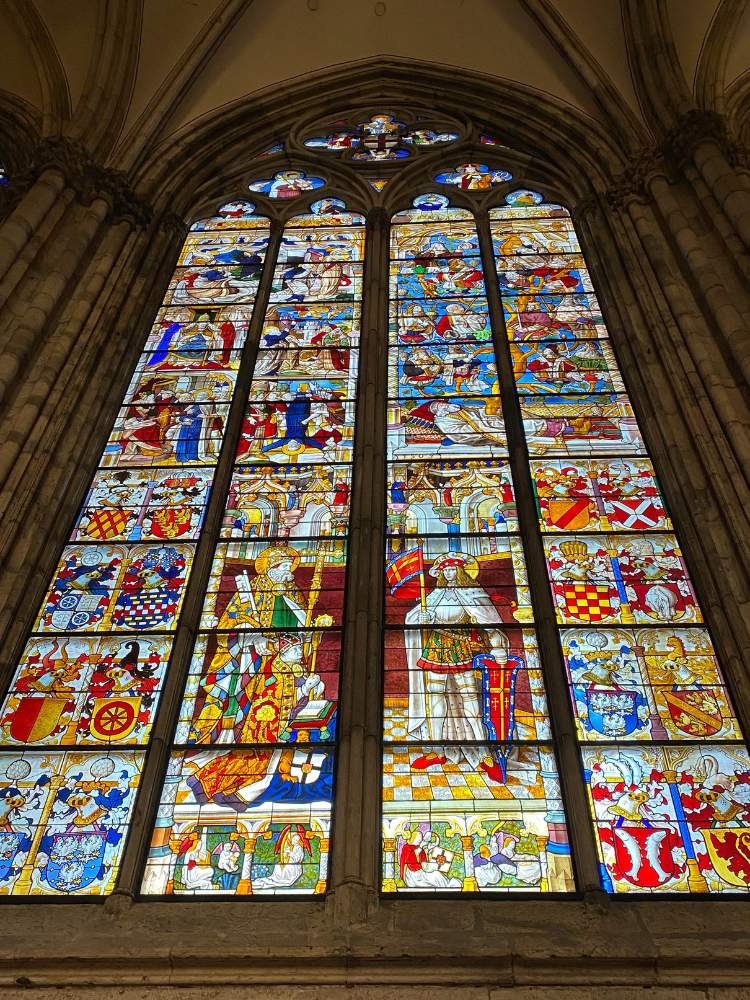
2. Explore Cologne’s historical churches
Cologne is home to some of the most impressive historical churches in Europe.
The city’s rich religious heritage is reflected in the beauty of its churches, many of which date back centuries. Among the most notable are the Church of St. Martin, a Romanesque church dating back to the 12th century.
Other notable churches in Cologne include the Church of St. Ursula, which contains the remains of thousands of virgins, and the Great St. Martin Church, a medieval church that survived World War II bombing.
Whether you’re interested in history, architecture, or religion, a visit to Cologne’s historical churches is a must-see experience.
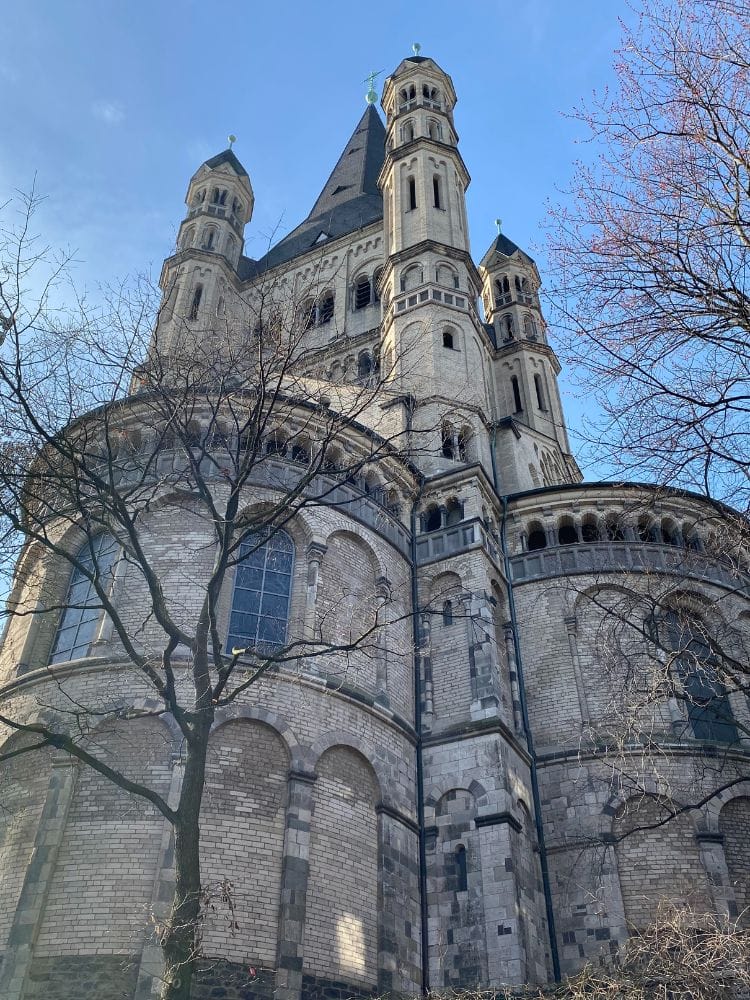
3. Visit Cologne’s Old Town
If you’re interested in history, you have to visit Cologne’s Old Town.
This neighborhood is located in the center of the city and is famous for its old streets with colorful buildings. There are also many great places to grab a drink or something to eat. Several breweries, pubs, and restaurants serving Kölsch beer and Halver Hahn sandwiches can be found here.
The Old Town has more to offer than just food and drinks. It’s also full of important cultural and historical places to see. You will see Cologne Cathedral, the old-style Romanesque church Great St. Martin, and the tower of the historic City Hall there.
And don’t forget the Heinzelmännchenbrunnen on Am Hof-Street! This fountain was built in 1899 and has the city’s beloved mythical creatures, the Heinzelmännchen.
Whether you’re into history, culture, or just love exploring new places, visiting the Old Town in Cologne is a must-do. Don’t miss it!

4. Visit the ancient Roman tomb
If you’re looking for a unique and fascinating experience in Cologne, you need to check out the ancient Roman tomb in Weiden district.
The tomb dates back to the 2nd century AD. It’s one of the best-preserved tombs of its kind in Germany and gives you a glimpse into the lives of the ancient Romans.
The tomb features impressive wall paintings and intricate carvings that tell a story about the life and death of the person who was buried there. It’s a fascinating example of Roman art and architecture, and it’s definitely worth a visit.
If you’re interested in history or just looking for a unique experience in Cologne, the Roman tomb is a must-see.
So, what are you waiting for? Get ready to travel back in time to ancient Rome!
5. Explore Cologne’s museums
Cologne is home to a lot of different museums that cater to all interests and ages. The city’s museums showcase a diverse range of topics, from art and history to chocolate and sports.
The Wallraf-Richartz Museum is one of the city’s most renowned art museums and features an extensive collection of European paintings from the medieval era to the modern age.
The Museum Ludwig is another must-visit destination, displaying contemporary art and an impressive collection of Pop Art.
For history enthusiasts, the Romano-Germanic Museum is a fascinating exploration of the Roman Empire’s impact on the region.
Additionally, the Chocolate Museum and the Sports Museum offer a unique and interactive experience for visitors. Whether you’re a local or a tourist, Cologne’s museums provide an excellent opportunity to learn about the city’s rich history and culture while having fun.
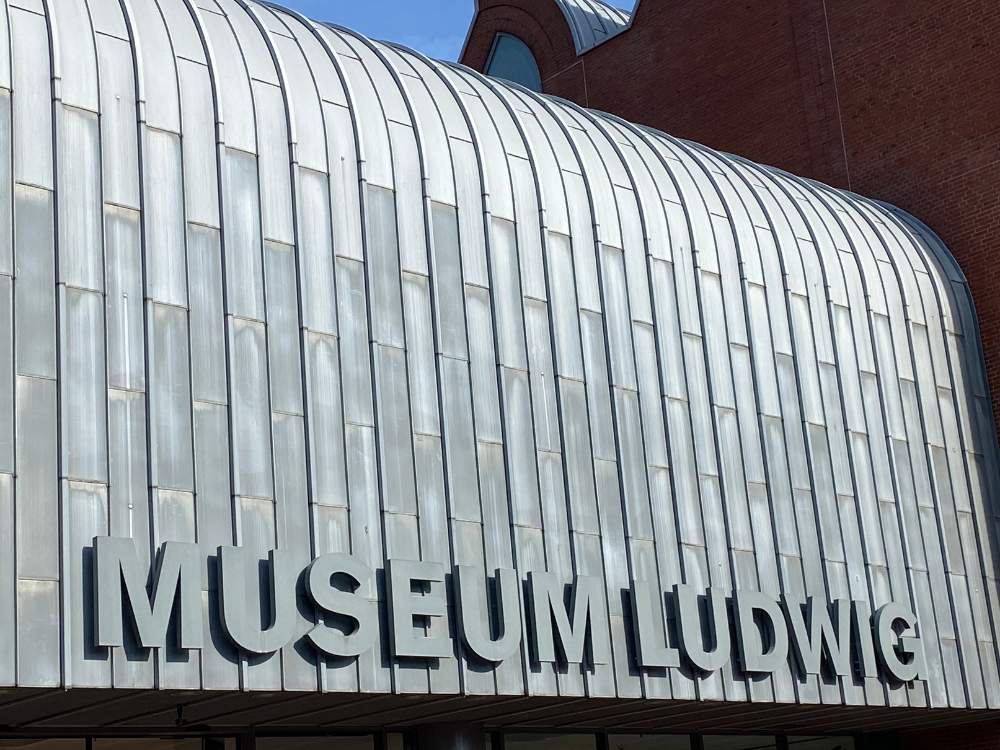
6. Enjoy a day at the spa
Cologne offers a relaxing escape from the city’s hustle with its two most prominent spas.
The Neptunbad, located in the district of Ehrenfeld, is a beautifully restored building that provides a variety of spa services. It features several saunas, steam rooms and pools. The spa is known for its massage treatments and offers a wide range of wellness programs.
The Claudius Therme, situated in a lush parkland along the Rhine River, offers an exceptional spa experience. The spa features indoor and outdoor pools, saunas, and steam rooms. Visitors can also take advantage of the spa’s variety of spa services, including massages, facials, and body treatments.
Both spas are equipped with various amenities, such as a restaurant and lounge areas, where visitors can unwind after their spa experience. For those seeking a relaxing day away from the city’s hustle, the Neptunbad and Claudius Therme are the perfect destinations.
7. Do some window shopping
Cologne is a shopper’s paradise, offering a diverse range of options for all tastes and budgets. The city’s two most famous shopping streets are Hohe Straße and Schildergasse, both located in the city center.
Hohe Straße is the perfect destination for fashion lovers, featuring a variety of high-street brands and luxury stores. On the other hand, Schildergasse offers a more diverse shopping experience, with a mix of international and local shops, as well as several department stores.
For those who prefer shopping malls, Cologne has a lot to offer as well. The Rhein Center, located in the west of the city, offers a wide selection of shops, restaurants, and entertainment options. It’s a great place to visit on a cold day, as it’s entirely indoors and offers a cozy atmosphere.
Another mall worth visiting is the Kalk Arcaden, situated in the district of Kalk. It features a variety of shops, including fashion, electronics, and home goods stores, as well as a food court.
Overall, Cologne offers an excellent shopping experience for both locals and visitors. Whether you prefer shopping streets, malls, or specialty shops, the city has something for everyone.
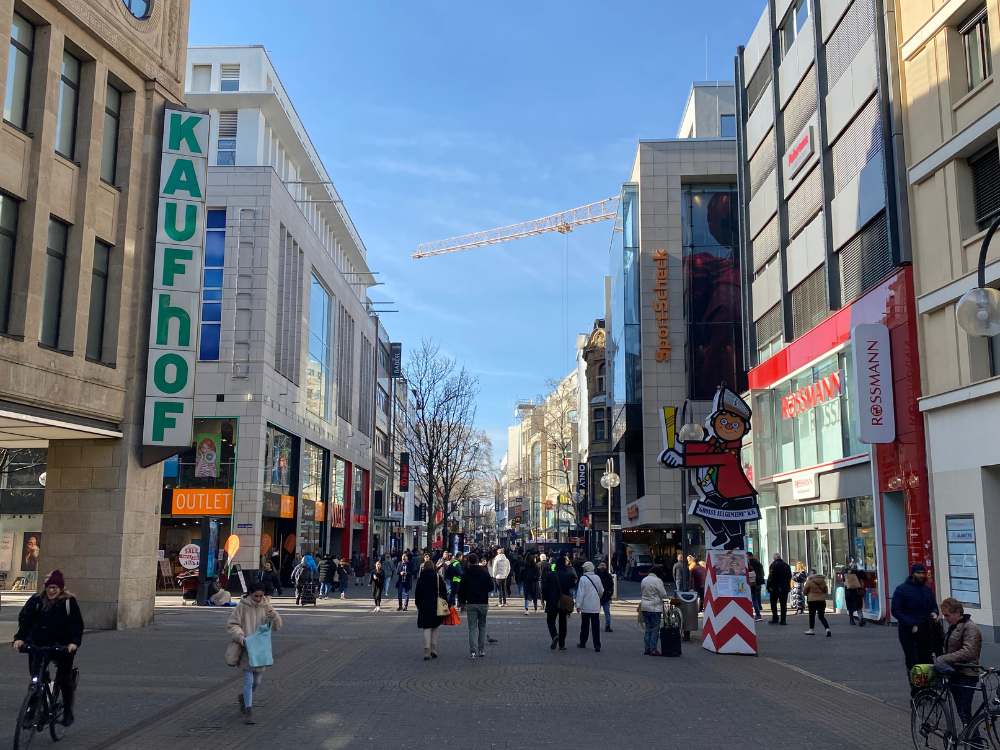
8. Time Ride
Step back in time with TimeRide for an exciting journey through history.
During your 45-minute stay, you will go on a special trip through history. At the side of hatter Tessa and streetcar driver Pitter, you will be in the middle of Cologne in the 1920s.
Your journey throught history starts at the cinema, where you will take a seat together with the fine society. An entertaining short film in the style of the 1920s will show you the historical development of Cologne during this time.
Your second stop will be at the hatter’s store where Tessa – the charming hatter – will tell you all you need to know about the world of glamorous fashion of the 1920.
On your following virtual ride of Cologne’s first electric streetcar, you experience the beauty of the city before its destruction in World War II.
With your VR goggles, you will enjoy a 360° panoramic view and discover iconic landmarks of old Cologne, many of which have disappeared or are barely recognizable today.
Holidays & Festivals in Cologne in March
Unfortunately, March is not a particularly eventful month for holidays and festivals in Cologne. While there may be some smaller local events or exhibitions taking place, there are no major holidays or festivals that are widely celebrated during this time.
Cologne in March: Travel Guide
Is Cologne good to visit in March?
Yes, Cologne is a good city to visit in March. This is because March is a quieter time to visit compared to the peak tourist season in the summer, which means you can enjoy the city’s attractions with fewer crowds. You’ll have more space and time to explore the city’s many museums and landmarks without feeling overwhelmed by the crowds.
What are the best places to stay in Cologne in March?
If you’re planning a trip to Cologne there are many great places to stay depending on your interests and budget. For those who want to be close to the city’s main attractions, staying in the city center, the old town, or the district of Deutz can be a good choice.
The city center is the heart of Cologne, with many hotels, restaurants, and shops within walking distance of popular sights like the Cologne Cathedral and the Rhine River. Staying in the city center can be convenient for tourists who want to be close to everything and easily explore the city on foot or by public transportation.
The old town is another popular area to stay in Cologne, with narrow streets, historic buildings, and lively bars. This area is especially popular with young travelers and those interested in the city’s nightlife.
Finally, the district of Deutz is located just across the Rhine River from the city center and is home to many hotels. Staying in Deutz can be a good choice for those who want to be close to the city center but prefer a more residential area.
Overall, there are many great places to stay in Cologne, and choosing the right location depends on your interests and priorities. Whether you want to be close to the city’s main attractions, explore its historic neighborhoods, or experience its vibrant nightlife, there’s something for everyone in this beautiful city.
What is the best time to visit Cologne Germany?
The best time to visit Cologne, Germany, largely depends on your interests, preferences, and priorities. However, there are a few factors to consider that can help you determine the most suitable time for your trip.
If you are interested in cultural events and festivals, the best time to visit Cologne is during the Carnival season, which typically takes place in February. The Carnival is one of the largest and most famous Carnival celebrations in the world, and it features colorful parades and parties. Keep in mind, however, that accommodations may be more expensive and harder to come by during this time.
If you prefer mild weather and outdoor activities, the best time to visit Cologne is during the late spring or summer months, from May to September. During this time, the city experiences warmer temperatures and longer days, making it an ideal time to explore the city’s many outdoor attractions and landmarks.
If you are interested in Christmas markets, the best time to visit Cologne is during the Advent season, from late November to December. The city is renowned for its many Christmas markets, which feature traditional foods, crafts, and decorations. The markets can be quite crowded during this time, but they are also a beloved part of the local culture.
Ultimately, the best time to visit Cologne depends on your individual interests and preferences. Consider what activities are most important to you, and plan your trip accordingly to ensure a memorable experience.
Is March a good time to visit Germany?
March can be a good time to visit Germany, but it depends on your interests and travel preferences. Here are some factors to consider:
- Weather: March in Germany can be quite variable. In some regions, it can still be quite cold, with temperatures below freezing and occasional snow. In other regions, it may be milder with some spring-like weather. However, you can generally expect some rain and wind throughout the country. So, if you are prepared for colder and possibly wetter weather, you may enjoy traveling to Germany in March.
- Crowds: In March there will be fewer tourists compared to the peak season in the summer. This can be a great time to visit if you prefer to avoid crowds and lines at popular attractions.
In summary, March can be a good time to visit Germany if you are prepared for cooler and possibly wet weather and enjoy fewer crowds.
What is the coldest city in Germany?
The coldest city in Germany is generally considered to be Munich, which is located in the southeast of the country. Munich has a continental climate with cold winters and relatively warm summers, with average temperatures in January ranging from -1 to 4 degrees Celsius (30 to 39 degrees Fahrenheit).
However, there are other regions in Germany that can even be colder in the winter months. The village of Kühnhaide, which is in Saxony, holds the record for the coldest temperature ever recorded in Germany.
In January 1940, the temperature in Kühnhaide dropped to -37.8 degrees Celsius, making it the coldest recorded temperature in Germany to date. Despite its small size, Kühnhaide has gained notoriety for this extreme weather event.
Frequently Asked Questions
Where is Cologne in Germany?
Cologne is a city located in western Germany, in the state of North Rhine-Westphalia. It is situated on the banks of the Rhine River and is the fourth largest city in Germany by population.
How to get to Cologne Germany?
Cologne is well-connected to other parts of Germany and Europe, and there are several ways to get there. Here are some options:
By Plane: Cologne is served by the Cologne Bonn Airport (CGN), which is located about 15 kilometers (9 miles) southeast of the city center. The airport has connections to many destinations in Europe and beyond, and is served by several major airlines. From the airport, you can take a train or bus to the city center.
In addition to the Cologne Bonn Airport, visitors can also arrive in Cologne via the Düsseldorf Airport (DUS) or the Frankfurt Airport (FRA). Both airports have connections to many destinations in Europe and beyond.
Düsseldorf Airport is located about 60 kilometers (37 miles) north of Cologne and is well-connected to the city by train, bus, and taxi. The journey takes approximately one hour and there are several direct train connections daily.
Frankfurt Airport is located about 200 kilometers (124 miles) southeast of Cologne and is one of the largest airports in Europe, with connections to destinations worldwide. From the airport, visitors can take a train to Cologne, which takes 1-2 hours, depending on the mode of transportation.
By Train: Cologne has several train stations, including the main station, which is one of the busiest train stations in Germany. The city is well-connected to other parts of Germany and Europe by high-speed trains, including the ICE and Thalys trains. You can check schedules and buy tickets online through the German railway company Deutsche Bahn.
By Bus: Several bus companies offer services to Cologne from other German and European cities, including Flixbus, Eurolines, and Megabus. The bus station is located next to the main train station.
By Car: If you’re driving, Cologne is easily accessible via the German autobahn network. However, keep in mind that traffic can be heavy, and parking in the city center can be difficult and expensive.
Is there Uber in Cologne?
Yes, Uber is operating in Cologne as of 2019. The ride-sharing service, which allows users to request a ride via a mobile app, has been gradually expanding its services across Germany since its launch in 2013.
After facing legal challenges in the country, Uber was able to launch its services in Cologne in 2019. The company has since expanded its operations in the city, with a growing number of drivers and riders using the platform to get around.
While Uber’s entry into the German market has not been without controversy, many customers have welcomed the increased competition and flexibility that the service offers.
For visitors to Cologne, Uber can be a convenient and affordable way to get around the city, particularly for those unfamiliar with the local public transportation system or who prefer the comfort and convenience of a private ride.
Is Cologne safe for travelers?
Cologne is generally considered a safe city for travelers. The crime rate in Cologne is low compared to other major cities in Germany and Europe, and visitors can usually move around the city without any major safety concerns.
However, as with any city, it’s important to take certain precautions to ensure your safety:
Be aware of your surroundings, especially in crowded areas and public transportation!
Keep an eye on your belongings and avoid carrying large amounts of cash or valuables with you!
Stick to well-lit and busy areas at night, and avoid walking alone in deserted areas!
Be cautious of pickpocketing and other petty theft, especially in crowded areas like tourist attractions and public transportation!
Follow basic traffic rules and be aware of bicycles and trams, which are popular modes of transportation in Cologne!
Overall, Cologne is a welcoming and safe city for travelers, but it’s always a good idea to take basic precautions to ensure your safety and security.
Can you drink tap water in Germany?
Yes, tap water in Germany is generally safe to drink. Germany has strict regulations regarding water quality and treatment, and the vast majority of tap water in the country is of high quality and safe for consumption.
In fact, in many parts of Germany, tap water is considered to be of higher quality than bottled water. It is also much cheaper and more environmentally friendly to drink tap water, as it eliminates the need for single-use plastic bottles.
Overall, drinking tap water in Germany is generally safe and a great way to stay hydrated during your travels.
If Cologne in March isn’t for you….
After reading this, you might not want to visit Cologne in March after all.
If so, check out the articles linked below about visiting Cologne during another month of the year.
Cologne in January: Weather Info & Travel Tips
Cologne in February: Weather Info & Travel Tips
Cologne in April: Weather Info & Travel Tips
Cologne in May: Weather Info & Travel Tips
Cologne in June: Weather Info & Travel Tips
Cologne in July: Weather Info & Travel Tips
Cologne in August: Weather Info & Travel Tips
Cologne in September: Weather Info & Travel Tips
Cologne in October: Weather Info & Travel Tips
Cologne in November: Weather Info & Travel Tips
Cologne in December: Weather Info & Travel Tips
23 Best Things to Eat at Cologne Christmas Market [Locals Pick]
WONDERING WHAT TO EAT AT COLOGNE CHRISTMAS MARKET? You’ve landed on the right article. I’m…
15 Things to Do in Cologne at Christmas
ARE YOU WONDERING WHAT TO DO IN COLOGNE AT CHRISTMAS? You’ve landed on the right…
20 Unusual Things to do in Cologne Germany
ARE YOU LOOKING FOR UNUSUAL THINGS TO DO IN COLOGNE GERMANY? Then you’re in the…
Best Free Walking Tour Cologne in 2023 [Locals Pick]
LOOKING FOR THE BEST FREE WALKING TOUR IN COLOGNE? You’ve landed on the right article….
Mixed Sauna in Germany – All you need to know
ARE YOU INTERESTED IN GERMAN SAUNA CULTURE? You’ve come to the right place! I’m from…
BEST 5 Stars Hotels in Cologne, Germany
ARE YOU LOOKING FOR THE BEST 5 STARS HOTELS IN COLOGNE GERMANY? You’ve landed on…
- 23 Best Things to Eat at Cologne Christmas Market [Locals Pick] - 18. October 2023
- 15 Things to Do in Cologne at Christmas - 11. October 2023
- 20 Unusual Things to do in Cologne Germany - 6. September 2023
